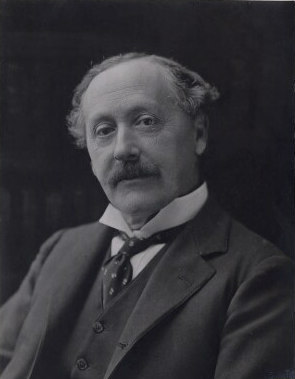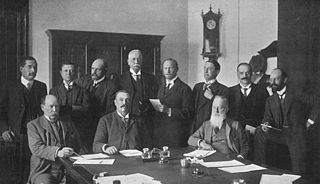
The Union of South Africa was the historical predecessor to the present-day Republic of South Africa. It came into existence on 31 May 1910 with the unification of the Cape, Natal, Transvaal, and Orange River colonies. It included the territories that were formerly a part of the South African Republic and the Orange Free State.

Southern Rhodesia was a landlocked self-governing British Crown colony in southern Africa, established in 1923 and consisting of British South Africa Company (BSAC) territories lying south of the Zambezi River. The region was informally known as south Zambesia until annexed by Britain at the behest of Cecil Rhodes's British South Africa Company, for whom the colony was named. The bounding territories were Bechuanaland (Botswana), Northern Rhodesia (Zambia), Moçambique (Mozambique), and the Transvaal Republic.

The president of South Africa is the head of state and head of government of the Republic of South Africa. The president directs the executive branch of the federal government and is the commander-in-chief of the South African National Defence Force. Between 1961 and 1994, the office of head of state was the state presidency.

The Parliament of the Republic of South Africa is South Africa's legislature; under the present Constitution of South Africa, the bicameral Parliament comprises a National Assembly and a National Council of Provinces. The current twenty-seventh Parliament was first convened on 22 May 2019.
Elections in South Africa are held for the National Assembly, provincial legislatures and municipal councils. Elections follow a five-year cycle, with national and provincial elections held simultaneously and municipal elections held two years later. The electoral system is based on party-list proportional representation, which means that parties are represented in proportion to their electoral support. For municipal councils there is a mixed-member system in which wards elect individual councillors alongside those named from party lists.

The Speaker of the National Assembly presides over the National Assembly of South Africa, the lower house of the Parliament of South Africa. The speaker is chosen from among the Members of the Assembly at its first sitting following a general election and whenever the office is vacant. The Speaker acts as a "referee", taking charge of debates to make sure that the MPs can participate freely while keeping to the rules. The Speaker also has managerial duties to ensure that Parliament runs smoothly. Each political party in the Assembly elects a chief whip to run its affairs. The presiding officers, the chief whips, and the Leader of Government Business together decide on the programme of work.
The Unionist Party was a pre-apartheid South African political party, which contested elections to the Union of South Africa parliament from the 1910 South African general election until its merger into the South African Party just before the 1921 South African general election.

The Leader of the Opposition in South Africa is the leader of the largest political party in the National Assembly that is not in government. The House of Assembly was the most important House from 1910 to 1994 and the National Assembly from 1994. The leader of the opposition acts as the public face of the opposition, leading the Official Opposition Shadow Cabinet and the challenge to the government on the floor of Parliament. They thus act as a chief critic of the government and ultimately attempt to portray the opposition as a feasible alternate government.

The South Africa Act 1909 was an Act of the Parliament of the United Kingdom that created the Union of South Africa out of the former Cape, Natal, Orange River, and Transvaal colonies. The Act also allowed for potential admission of Rhodesia into the Union, a proposal rejected by Rhodesian colonists in a 1922 referendum. The draft proposal was supported by the four colonial parliaments, but was opposed by Cape Colony premier W. P. Schreiner, who raised concerns that it would strip rights from non-white South Africans.
The system of racial segregation and oppression in South Africa known as apartheid was implemented and enforced by many acts and other laws. This legislation served to institutionalize racial discrimination and the dominance by white people over people of other races. While the bulk of this legislation was enacted after the election of the National Party government in 1948, it was preceded by discriminatory legislation enacted under earlier British and Afrikaner governments. Apartheid is distinguished from segregation in other countries by the systematic way in which it was formalized in law.

The Leader of the Opposition in South Australia is the leader of the largest minority political party or coalition of parties, known as the Opposition, in the House of Assembly of the Parliament of South Australia. By convention, the leader of the opposition is a member of the House of Assembly. The leader acts as the public face of the opposition, and acts as a chief critic of the government and ultimately attempt to portray the opposition as a feasible alternate government. They are also given certain additional rights under parliamentary standing orders, such as extended time limits for speeches. Should the opposition win an election, the Leader of the Opposition will be nominated to become the Premier of South Australia.

Herbert John Gladstone, 1st Viscount Gladstone, was a British Liberal politician. The youngest son of William Ewart Gladstone, he was Home Secretary from 1905 to 1910 and Governor-General of the Union of South Africa from 1910 to 1914.
This list consists of lists of legislation.
The provincial councils were the legislatures of the four original provinces of South Africa. They were created at the foundation of the Union of South Africa in 1910, and abolished in 1986 when they were replaced by a strengthened executive appointed by the State President. The four provincial councils were the Cape Provincial Council, the Natal Provincial Council, the Transvaal Provincial Council and the Orange Free State Provincial Council.

The first South African military medal was a campaign medal, the South Africa Medal, instituted in 1854 by Queen Victoria, the sovereign of the United Kingdom of Great Britain and Ireland, for award to officers and men of the Royal Navy and British Army who served on the Eastern Frontier of the Cape Colony between 1834 and 1853 during the Xhosa Wars.

In May 1895, Queen Victoria authorised Colonial governments to adopt various British military medals and to award them to their local permanent military forces. The Cape of Good Hope and Colony of Natal instituted their own territorial versions of the Meritorious Service Medal in terms of this authority. These two medals remained in use in the respective territories until after the establishment of the Union of South Africa in 1910.

The National Convention, also known as the Convention on the Closer Union of South Africa or the Closer Union Convention, was a constitutional convention held between 1908 and 1909 in Durban, Cape Town and Bloemfontein. The convention led to the adoption of the South Africa Act by the British Parliament and thus to the creation of the Union of South Africa. The four colonies of the area that would become South Africa - the Cape Colony, Natal Colony, the Orange River Colony and the Transvaal Colony - were represented at the convention, along with a delegation from Rhodesia. There were 33 delegates in total, with the Cape being represented by 12, the Transvaal eight, the Orange River five, Natal five, and Rhodesia three. The convention was held behind closed doors, in the fear that a public affair would lead delegates to refuse compromising on contentious areas of disagreement. All the delegates were white men, a third of them were farmers, ten were lawyers, and some were academics. Two-thirds had fought on either side of the Second Boer War.
The Royal Cape Golf Club in Cape Town, South Africa was established in 1885 and is the oldest golf club in Africa.